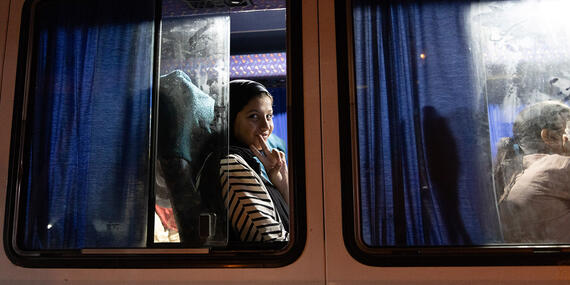Today's top news: Occupied Palestinian Territory, Ukraine, Bangladesh

Occupied Palestinian Territory
OCHA has today observed the return of thousands of people into parts of Khan Younis. This includes central and eastern neighbourhoods in the city, as well as the adjacent area of Bani Suhaila. Their return follows the announced completion of ground operations by Israeli forces in those areas earlier this week.
Meanwhile, yesterday the World Health Organization (WHO) supported a complex joint effort to evacuate 85 sick and severely injured patients from Gaza to Abu Dhabi. The medical evacuation, which was the largest from Gaza since October, was a partnership with the Emirati Government and other organizations.
The patients included 35 children, with more than 60 caregivers and family members accompanying the patients. The group was transferred from Gaza via the Kerem Shalom crossing.
A reminder that more than 10,000 people still need medical evacuation from Gaza.
WHO’s Director-General Dr. Tedros Adhanom Ghebreyesus said he hopes this will pave the way for the establishment of evacuation corridors via all possible routes, including the Kerem Shalom and Rafah crossings to Egypt and Jordan and from there to other crossings. He also called for evacuations to the West Bank, including East Jerusalem, to be restored, saying thousands of sick people in Gaza are suffering needlessly.
In the West Bank, OCHA says attacks by Israeli forces and settlers continue to have a devastating impact on Palestinians.
According to the latest figures from OCHA, six people were killed and nearly 80 Palestinians – including almost two dozen children – were injured by Israeli forces or settlers in incidents across the West Bank in just a single week, between 23 and 29 July.
On Thursday, 1 August, OCHA's Head of Office for the Occupied Palestinian Territory, Andrea De Domenico, will brief the UN press corps during the Daily Press Briefing at 12 p.m. New York time. He will speak to journalists remotely from East Jerusalem.
Ukraine
Ukraine's Humanitarian Coordinator, Denise Brown, led a humanitarian convoy to a front-line community in the Donetsk Region, in the east of the country.
The inter-agency convoy delivered nearly 10 tons of medical supplies and hygiene kits, including essential dignity kits for older people and people with disabilities. This is the 24th convoy to front-line areas in the Donetsk Region this year alone.
The community there has suffered unrelenting hostilities for over a decade, causing widespread devastation on homes and critical civilian infrastructure and services. Many residents are left without electricity, safe water supplies and adequate healthcare and many people rely on humanitarian assistance.
Meanwhile, the UN and partners continue to provide assistance across the country. OCHA reports that in the first half of 2024, humanitarian organizations provided humanitarian assistance to 5.6 million people.
The US$3 billion Humanitarian Response Plan for Ukraine is currently 39 per cent funded with $1.2 billion received. The significant funding gap continues to hinder the humanitarian community's ability to fully address critical needs ahead of the winter season in Ukraine.
Bangladesh
Nearly 13 million people across 30 per cent of Bangladesh have been affected by climate emergencies this year.
To respond to the floods, the Government, the UN and partners launched in June a $80 million Humanitarian Response Plan to support 1.2 million people. The appeal is currently 18 per cent funded with 14.5 million received.
Humanitarian partners are facing operational challenges, with recent Internet outages, bank closures and curfews severely disrupting cash and other assistance to communities affected by Cyclone Remal and recent floods. For example, more than 15,000 adolescent girls and pregnant women were unable to access sexual and reproductive health services, while nearly 6,000 children missed out on critical immunizations.
Despite the challenges, humanitarian organizations continue to provide support. On 5 June, a $7.5 million from the Central Emergency Response Fund was made available to support the response to Cyclone Remal, while on 4 July, an additional $6.2 million of CERF funding was released, allowing for the successful distribution of cash payments to communities in the Jamuna Basin, in anticipation of the flooding and ensuring they had some support during the shutdown.
With the increased connectivity and longer curfew breaks, our humanitarian partners are gradually resuming their activities.
